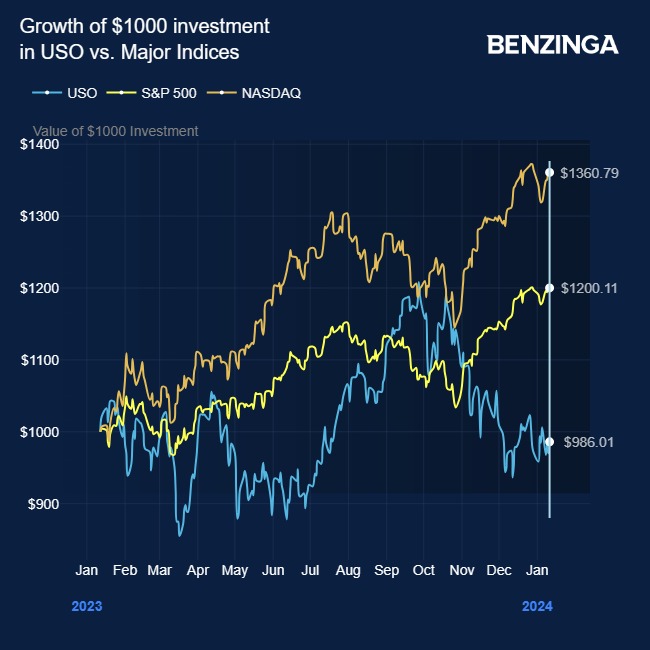Zinger Key Points
- Brent crude moves back above $80 per barrel as tensions intensify
- Biden says 'will not hesitate' to take further measures following airstrikes
- Pelosi’s latest AI pick skyrocketed 169% in just one month. Click here to discover the next stock our government trade tracker is spotlighting—before it takes off.
Crude oil prices jumped by more than 4% in early trade on Friday as tensions in the Middle East and Red Sea intensified following U.S.-led airstrikes on Houthi rebel targets in Yemen.
Brent crude rose by 4.1% to $80.50 a barrel, while Nymex WTI jumped 4.2% to $75.02 a barrel. The United States Oil Fund USO, an exchange-traded fund (ETF) that tracks the price of light-sweet crude, was up 3.5% in pre-market trade, following a 1.7% gain in the previous session.

Prices have come under upward pressure in recent sessions as tensions in the oil shipping area of the Red Sea and Arabian Gulf have come under increasingly frequent attacks from Yemen-based Houthi rebels, supported and funded by Iran.
Iran itself seized an oil tanker, the St Nikolas, bound for Turkey on Thursday in the Gulf of Oman.
Stakes Raised As Coalition Airstrikes Target Yemen
But the stakes were raised overnight after the U.S. and U.K. launched airstrikes on Yemen, reportedly killing at least five people. President Joe Biden and Prime Minister Sunak both issued statements.
Biden said: “These strikes are in direct response to unprecedented Houthi attacks against international maritime vessels in the Red Sea.”
He concluded: “I will not hesitate to direct further measures to protect our people and the free flow of international commerce as necessary.”
In response to the airstrikes, which targeted Houthi strongholds, radar installations, missile launch and storage sites, the Houthi leadership said the U.S. attacks “won’t go unpunished” and pledged to continue targeting shipping around the Red Sea.
Oil Flow Choke Point Concerns
Warren Patterson, chief commodity strategist at ING, said that the Gulf of Oman, where Iran seized the St Nikolas, is near the Strait of Hormuz, a critical choke point for oil flows.
He added: “More than 20m barrels per day of oil moves through the Strait of Hormuz, which is equivalent to around 20% of global consumption. So clearly, more significant disruptions to oil flows in this region will be much more alarming for markets.”
Shares in oil stocks responded positively to the rise in oil prices. Shares in the U.K. oil giant BP BP were up 1.3%, while in pre-market trade, Chevron CVX gained 1.3% and ExxonMobil XOM added 1.5%.
The Energy Select Sector SPDR Fund XLE an exchange trade fund holding all the U.S. oil majors and smaller producers and explorers, was up 1.8% in pre-market trade.
Gasoline Moves Higher
Where crude prices lead, refined and distilled products follow. The price of RBOB Gasoline rose by 3.4% to $2.186 a gallon in early trade. Meanwhile, heating oil jumped 3.4% to $2.7633.
Both of these moves came after U.S. stockpiles of gasoline and distillates were shown to have surged for two weeks in a row.
The last heard average price per gallon of gas at the pump in the U.S. was $3.08.
Image: Shutterstock
Edge Rankings
Price Trend
© 2025 Benzinga.com. Benzinga does not provide investment advice. All rights reserved.
Trade confidently with insights and alerts from analyst ratings, free reports and breaking news that affects the stocks you care about.